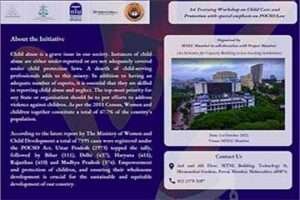The Democratic Line
Adhyayan Foundation for Policy And Research, a Lucknow based not for profit, research Think Tank is inviting contributions for the November Issue of its monthly magazine “The Democratic Line”.
About the Organisation
Adhyayan Foundation For Policy And Research
Adhyayan Foundation for Policy & Research (AFPR) is an independent nonprofit, research, and educational organization dedicated to producing quality research to help in the formulation, assessment, and implementation of public policies. We aim at covering a wide range of issues that are of significance to this country from economy to administrative efficiency and from legal lacunas to international affairs. We strive towards bridging the gap in policymaking for the wholesome growth and development of our country.
About the Publication The Democratic Line
Published from Lucknow, The Democratic Line is a monthly journal issued under the name of AFPR, a policy think tank (registration- NPC [section 8] Companies Act)
“Inspire and Aspire”
The distinctive feature of The Democratic Line is to bring together the academicians, researchers, policymakers, lawyers, experts, and activists coming from different fields to debate and discuss various social science disciplines (Political Studies, Legal Studies, Economic Studies, International Relations) and bring in a unique platform for both knowledge and opportunity.
Adhyayan Foundation is coming out with the eighth edition of “The Democratic Line” for which it is inviting contributions under the heads “Cover Story”, “Essay” and “From the Corridors of Justice” the themes of which are given below.
Structure of the Magazine and Respective Themes
COVER STORY: This segment is inviting entries under the following heads under the broader theme of “Technology and Law”. The sub-heads are as follows:
- Cyber-security
- OTT Platform Regulations
- Ai Facial Recognition: Issues
- IR Rules 2021 and it’s repercussions
- Cyberbullying and Cyberstalking: An emerging issue
- The Contours of Identity theft
- AI and Financial sector
- Cyber Risk Insurance
- Regulatory Challenges in Robotics in India
- Fintech Valley Vizag: A case study
- Pegasus type spyware and the malice they cause
- Social media platforms: Is it connecting people or is it a new form of suvillenace
- Children’s rights in the digital environment
- Legal and ethical aspects of technology and algorithm
- Consumer Rights in the online environment
- General Data protection regulation and its effects
- Cryptocurrency: to ban or not to ban
The list is not exhaustive and contributions are invited under the following two categories for “Cover Story”:
- Long Article (2000-3000 words, excluding endnotes): Articles must comprehensively analyse the contemporary policy or legal issue that the author(s) seeks to highlight. Articles would include research articles and theoretical discussions on such theme of policy or law. It must either indicate the lacunae therein or, attempt to suggest possible changes, which can address the said lacunae or alternatively holistically cover the subject matter while offering a critical analysis of the chosen theme.
- Short Article (2000 words, excluding endnotes): Articles must be concise and condensed in their scope and conceptualisation vis-a-vis long articles. They must challenge existing principles and provide a fresh interpretation of an issue.
ESSAY: (2000 words, excluding endnotes): Contributions are invited in this segment pertaining to any social, policy, or legal issue of contemporary relevance. The essay must be an analysis of the problem(s) or idea(s) dealt with by the author and should include references to a range of sources and contributions in the form of alternatives and suggestions.
FROM THE CORRIDORS OF JUSTICE: (1500- 2000 words, excluding endnotes): Articles are invited under this segment to discuss and deliberate upon the latest developments in the legal arena which is of social relevance. Articles are invited under the head of:
- A dawn of women in Indian Judiciary: Is the issue of representation being addressed?
The list is not exhaustive, contributions must be an analysis of a recent judgment, bringing out its relevance in light of the development of laws, views expressed in the judgment, and views of the author(s).
Eligibility
Students pursuing a BA/MA ( in any discipline) and Law students pursuing either three-year LL. B, or the five-year integrated LL.B. program, as well as students pursuing their LL.M. or Ph.D. Research Scholars, Law Professionals, Academicians, and Representatives of NGOs, are also eligible for contributions to the magazine.
Submission Procedure and Guidelines
- All original submissions must be accompanied by an abstract not exceeding 300 words, which should be included within the document of the manuscript itself.
- Emails must be sent with the subject line <Submission TDL, Issue 10>, <Category Head>, <Category Sub-head(if any)>.
- All submissions must be in MS Word format (.doc) or (.docx), with Times New Roman font (body: size 12, line spacing: 1.50; footnotes: size 10, line spacing: 1.00).
- The Magazine uses only endnotes (and not footnotes) as a method of citation. The endnotes must follow the Bluebook: A Uniform System of Citation (20th Edition).
- The submissions must be accompanied by a cover letter with details regarding the name of the author(s), email address, contact number and name and address of the institution, academic qualifications/affiliations of the author(s), title of the manuscript.
- The author(s) must provide a declaration of originality with regards to their submission in the body of the email.
- The manuscript itself must not contain any information as to the name(s) of the author(s), the institution, address or any other information that may reveal or indicate their identity.
- Co-authorship is permitted for up to 2 authors for all categories of submissions.
- Submissions made should be on an exclusive basis i.e., the submission should be unpublished and should not be under any concurrent consideration.
- All follow-up emails must be sent in the original thread of submission only.
All submissions must be made to thedemocraticline[at]gmail.com before 23:59 hours, 15th October 2021.
Previous Posts
Call for Blogs: Indian Commercial Law Review and Practice
Global Sports Policy Review: Vol 2 Issue 1




